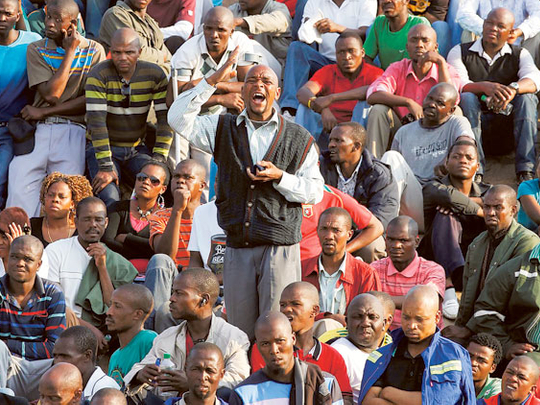
Marikana, South Africa:This week’s mourning for 34 miners shot dead by South African police has stirred painful memories among surviving miners, a week after bullets rained down on them.
“Everywhere we were, they were shooting,” one striker told AFP, recalling the tragic events that left a rocky field strewn with the bodies of platinum mine workers.
“Even at night when I sleep, I keep hearing those gunshots,” he said.
The father-of-two who was too afraid to give his name said he owed his survival to nothing more than luck.
“All the people who were here are dead, they are gone,” he said as he escorted AFP around the hillside where the killings took place.
“I was was that side,” he said pointing to the opposite side of the hill. “That’s why I survived... I ran,” he said, adding that he had worked at Lonmin for two years.
“I don’t trust these police anymore. If they see my name in the newspaper, they will go to Lonmin. Lonmin will give them my address. Our home affairs has all our names. No, it’s not safe. The police will track me to my house and attack me at night.”
The striker alleged that police were still harassing workers at their homes.
“Yes, even last night they came, kicking our doors. We don’t know what they want,” concurred one of his friends, who gave his name as Victor.
Workers’ leader Zolisa Bodlani claimed that one worker was shot at from a helicopter and another at close range while he lay on the ground bleeding from bullet wounds — claims that cannot be verified.
Asked why they carried weapons during their strike, the reason police gave for opening fire, they denied carrying firearms.
“No-one was carrying guns, pangas [machetes] yes. There’s no strike in South Africa where you come holding a banana,” the first man said.
“Even our President Jacob Zuma, when marrying, he is holding umkhoto, the spear. By holding that thing, it shows you are serious about what you are doing.”
The strikers, he said, remained defiant, saying they would not return to work until their salary demands were met.
“That blood cannot be spilt for nothing. Even their souls can’t rest in peace if we leave this,” he said.
Rock drill operators have led the strike, demanding a monthly salary of 12,500 rand ($1,200). They say they earn 4,000 rand a month, but Lonmin says that with bonuses and perks, they earn around 11,000 rand.
Their wage demand aside, they want justice for the killers.
“Those people who killed our brothers, we want to know them. We want justice against those people amaberede,” the striker said, using a slang for police.
Nearby, a pair of sneakers, a navy blue sports jacket and a blanket lie strewn on a small rock outcrop. Some of the rocks have neon yellow paint markings made by investigators.
“This is a sign that someone was killed here,” he explained.
Lonmin will not dare to sack them now, he added.
“Even if they fire us, they can’t replace us. We will make it difficult for anyone else to come and work here.”












